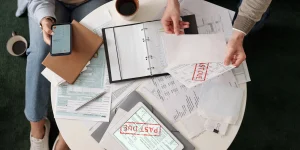Collection pressure from a large national bank can feel overwhelming. You may be going about your day when a call comes in from an unknown number, followed by a firm voice demanding payment on an account you have not thought about in years. Letters arrive, online notices appear, and suddenly your past due balance feels like a constant shadow over your life. That is how many people first experience Capital One Bank Harassment when contact begins about an overdue credit card, personal loan, or overdraft.
You might not remember the account clearly. You may dispute the amount that is claimed. You might be worried about lawsuits, wage garnishment, or damage to your credit. On top of that, the tone of the collection calls can sometimes feel less like a conversation and more like a threat.
Even if the debt is real, you are not powerless. Federal law places strict limits on what collectors can do and gives you ways to fight back. This guide explains how Capital One Bank operates when accounts go delinquent, what Capital One Bank Debt Collection looks like in practice, and when ordinary collection crosses the line into illegal harassment.
You will also see how to document what is happening, how to demand proof of the debt, how to protect your credit reports, and how a dedicated consumer firm such as Consumer Rights Law Firm PLLC can step in to stop abusive behavior and help you pursue compensation when your rights have been violated.
Who Capital One Bank Is And How It Collects
Capital One Bank is part of Capital One Financial Corporation, a major United States financial institution based in McLean Virginia at 1680 Capital One Drive. The company is one of the largest issuers of credit cards in the country and also offers checking and savings accounts, auto loans, and other consumer financial products.
Because it issues so many accounts, a significant number eventually fall behind. When that happens, Capital One Bank uses internal collection departments, outside law firms, and sometimes third party vendors to pursue payment. In many cases the bank keeps ownership of the account but assigns day to day collection to a specialized team. In other situations, old charged off accounts may be sold to debt buyers, which then use their own agencies.
This means you may hear from the bank itself, from a law office acting for the bank, or from another company handling a portfolio that includes your account. Even when a call comes from inside the organization, the conduct is still subject to federal consumer protection rules when the bank acts in a collection role similar to a third party.
In practical terms, Capital One Bank can send statements, letters, emails, or text messages about overdue accounts, can call you to request payment, and can use online systems to display balances and payment options. None of that gives the bank the right to bully, mislead, or abuse you.
Capital One Bank Debt Collection is supposed to be firm but fair. When it becomes confusing or frightening, the bank may be crossing important legal lines.
Why You Are Hearing From The Bank About Old Debt

You may wonder why you are hearing about an account now when you have not used that card or that line of credit for a long time. When an account goes unpaid, the bank usually follows a staged process. At first, late fees are added and reminder notices go out. Internal staff may make calls to encourage you to catch up.
If the account remains unpaid for several months, it may be charged off. A charge off is mostly an accounting term. It means the bank now treats the debt as a serious loss for tax and reporting purposes. It does not mean that you no longer owe the money. Once an account reaches that point, the bank may intensify collection efforts, place the account with outside counsel, or sell a group of delinquent accounts to a debt buyer.
🔗 Knw more about: Electronic Fund Transfer Act
When you hear from Capital One Bank at this stage, there are several possible reasons.
The bank may still own the account and have an internal team working older files. You could be part of a group of accounts that the bank is reviewing more aggressively before deciding which ones to pursue in court. You might also be receiving contact because your account information was recently updated or matched to a new address or phone number, making you easier to reach.
In some cases, you might be hearing from a collector for the first time even though the account has been in default for years. Changes in technology, data matching, and credit reporting can suddenly place you back on the radar for a very old obligation. That is why it is essential to understand not only what the bank is saying today but also how old the debt really is and what has happened to it over time. Capital One Bank has the right to ask for payment on valid debts, but the age and history of the account can limit what legal tools it can use.
If you are unsure why the bank is contacting you now, that uncertainty is a signal to slow down and insist on clear written explanations before you make any decisions.
When Normal Capital One Bank Debt Collection Turns Into Harassment


Some level of contact from a creditor is expected when you fall behind. One or two polite calls to remind you of a missed payment, or a letter explaining your options, are not unusual. Problems arise when Capital One Bank Debt Collection goes from routine contact to constant pressure.
Capital One Bank Harassment can take many forms. You might receive multiple calls in one day, including early in the morning or late at night, even after you have said that a certain time is inconvenient. Representatives may repeatedly mention lawsuits, garnishment, or account closure in a way that feels more like a threat than an explanation. You may feel that you are being rushed to make payment decisions during the very first call.
Sometimes consumers report that they asked for details in writing but the calls continued without clear documentation. Others say that when they tried to explain a dispute or a hardship, the representative raised their voice, interrupted, or made comments that felt shaming rather than helpful.
When pressure from the bank makes you feel scared, cornered, or unable to think clearly, you may be experiencing Capital One Bank Harassment rather than legitimate collection. At that point, it is time to step back, learn your rights, and consider bringing in legal help.
Your Rights Under Federal Debt Collection Law
Even when a large bank is involved, federal law protects you from unfair treatment during collection. The Fair Debt Collection Practices Act is the primary federal statute that governs collection behavior for third party agencies, and its principles strongly influence how major creditors are expected to behave when they collect consumer debts.
Under federal standards, collectors may not
Call you at times they know are clearly inconvenient, such as very early morning or late at night
👉 • Use threats of violence, obscene language, or repeated calls with the goal of harassing you
👉 • Claim that you will be arrested or imprisoned for not paying a consumer debt
👉 • Pretend to be a government agency or a law firm if that is not accurate
👉 • Misrepresent the amount you owe or imply that legal action has already been taken when it has not
👉 • Tell neighbors, colleagues, or extended family about your debt, except in very narrow circumstances allowed by law
You also have a right to receive a written notice describing the amount claimed, the name of the current creditor, and your right to dispute the debt within a specific time period. If you send a timely written dispute, collection should pause until you receive additional information that reasonably supports the claim.
The Federal Deposit Insurance Corporation and other regulators repeatedly remind consumers that they can and should file complaints with agencies such as the and the Federal Trade Commission if they believe collectors have broken the law. These complaints help identify patterns of abuse and can lead to enforcement actions against banks and collection vendors.
If your experience with the bank or its agents includes any of the behavior described above, you should treat that as more than just unpleasant customer service. It may be evidence of a legal violation.
How Capital One Bank Collection Agency Activity Affects Your Credit


When an account becomes seriously past due, it does not stay invisible. Late payments, charge offs, and collection entries are often reported to the major credit bureaus. If the bank uses a vendor or a law firm that functions like a Capital One Bank Collection Agency then collection related information may appear on your credit report under that name or under the name of a debt buyer.
Capital One Bank wants to recover money, but its collection records must still be accurate. Credit reports must show the correct balance, correct dates, and the correct status of the account. If a Capital One Bank Collection Agency entry shows the wrong amount, duplicates the same debt in more than one place, or misstates the date that the account first went delinquent, your credit score can be harmed more than it should be.
A negative entry from Capital One Bank can affect your ability to obtain housing, car loans, or even some jobs. The Fair Credit Reporting Act gives you powerful rights to challenge these entries. You can obtain your reports, identify errors, and send written disputes to each bureau that reports incorrect information. The bureaus must investigate and either verify, correct, or remove the entry.
If the company that furnished the information to the bureaus does not fix inaccurate reporting after a proper dispute, you may be entitled to take legal action for damages. That is one reason it is important to keep copies of everything the bank or any Capital One Bank Collection Agency sends you, and to save proof of delivery for every dispute letter you mail.
How To Respond When The Bank Or Its Collectors Contact You
The first instinct when a collector calls is often to panic or to talk until you feel pressured into making a promise. A calmer, more deliberate response will always protect you better.
When the phone rings, you do not have to pick up immediately. Letting calls go to voicemail while you get organized can give you time to think. When you do answer, remember that you are allowed to ask questions.
You can politely request the full name of the caller, the department they work in, and a callback number. You can ask for the name of the original account, the last four digits of the account number, and the current balance. You do not need to agree to any payment on the spot.
After the call, start a simple log.
Write down the date and time of the call
➡️ • Note the phone number that appeared on your screen
➡️ • Record the name the representative gave
➡️ • Summarize the key points of the conversation
Do the same for every future call. Keep all letters, emails, and text messages in a dedicated folder. This record will help you and any lawyer you work with to evaluate whether the bank followed the rules.
If you have not already received a written notice about the debt, wait for it. Federal rules expect that you will receive a letter with important details. Once you have that letter, compare the information with your own records as best you can. If the debt looks unfamiliar or the amount seems wrong, consider sending a written dispute right away.
When the representative asks for payment, you can say that you will not make any decisions until you have had a chance to review your records and speak with a lawyer if needed. That is a reasonable position. A representative who tries to push you past that boundary may already be acting inappropriately.
Using Documentation And Validation To Challenge The Debt


Documentation is one of your strongest protections. When you dispute a debt in writing, the collector should not simply repeat the same demand. Instead, it should provide information that reasonably supports the claim that you owe what it says you owe.
A good validation request letter should include:
A clear statement that you dispute the debt or part of it
✅ • A request for the name and address of the original creditor
✅ • A request for an itemized breakdown of the balance showing principal, interest, and fees
✅ • A request for copies of any statements or agreements that connect you to the account
Send your letter by a method that provides tracking and proof of delivery. Keep a copy of the letter itself and of the delivery receipt.
If the bank or its vendor responds with clear records that match your history, you are still entitled to ask questions, explore hardship options, or seek legal advice before you pay. If the response is vague or does not match your memory, you may decide to dispute the debt more aggressively, especially if the bank continues to report it to the credit bureaus.
Strong documentation also matters if you pursue claims under the FDCPA or FCRA. Call logs, copies of letters, and screenshots of messages are often what allow lawyers and courts to see patterns of Capital One Bank Harassment and credit reporting errors.
Lawsuits And Legal Risks In Bank Debt Collection
Large lenders sometimes bring lawsuits when they believe it will be an effective way to collect unpaid accounts. If you receive court papers connected to an account with this bank, you are no longer dealing only with phone calls. You are now involved in a legal case that can end with a court judgment if you do not respond.
A typical complaint in a credit card case will claim that you entered into an agreement with the bank, that you used the account, that you stopped making payments, and that the bank is owed a specific amount plus interest and costs. The summons will state how many days you have to file an answer with the court.
If you do nothing, the bank can ask the court for a default judgment. With a judgment, it may be able to garnish wages, levy bank accounts, or place liens on certain property, depending on your state law. That is why it is never safe to ignore a lawsuit, even if you believe the debt is old or incorrect.
The good news is that banks and their vendors do not always have all the documentation they need to prove their claims. They may be missing key records or may not be able to show a complete payment history. In some situations, the statute of limitation for suing on the debt may have already expired.
A consumer rights attorney can review the complaint, compare it with your records, and help you file an answer that denies unsupported allegations, raises defenses, and asserts counterclaims if the bank or its agents violated federal law during collection.
How Consumer Rights Law Firm PLLC Can Help You Fight Back
Dealing with a powerful lender by yourself is stressful. Consumer Rights Law Firm PLLC focuses on helping consumers who are being harassed by creditors and debt collectors. The firm is based in North Andover Massachusetts and concentrates on debt collection harassment, unfair credit reporting, and related consumer protection issues.
Contact details:
📌 Consumer Rights Law Firm PLLC
133 Main Street Second Floor
North Andover MA 01845
📞 Phone 877 700 5790
📩 Email help@consumerlawfirmcenter.com
👤 Visit :Better Business Profile
The firm helps consumers across the country who are facing repeated calls, threatening letters, or confusing legal papers. Its attorneys are experienced with claims under the Fair Debt Collection Practices Act, the Fair Credit Reporting Act, and the Telephone Consumer Protection Act.
When you reach out, the team can:
Evaluate your situation and advise you on your rights
✔️ • Review your call logs, letters, and credit reports for potential violations
✔️ • Communicate directly with the bank or its agencies so you no longer have to handle every call yourself
✔️ • Send formal demands that unlawful conduct stop and that the account be validated
✔️ • Defend you in any lawsuit connected to the debt
✔️ • Pursue money damages when collection behavior has broken the law
Because many consumer protection laws allow winning consumers to recover attorney fees from the collector or creditor, you may be able to obtain help without paying large legal fees upfront.
Practical Tips To Reduce Stress While You Deal With Collection


Financial pressure affects every part of life. While you are learning about your rights and considering your legal options, you can also take simple steps to protect your peace of mind.
Keep all related documents in a single folder instead of scattered around the house
🚨 • Set aside a limited time each day or each week to deal with collection issues and avoid thinking about them nonstop
🚨 • Let unknown numbers go to voicemail when you feel overwhelmed, then listen later and add details to your log
🚨 • Avoid making promises or payment plans while you are upset; give yourself time to calm down and think
🚨 • Reach out to trusted friends, family members, or counselors if you feel ashamed or anxious
Debt problems are extremely common, especially after job loss, illness, or family emergencies. Feeling embarrassed will not help you solve the problem. Treat yourself with the same compassion you would offer someone else in your position.
Success Stories
- 🏆 I was being harassed by Accounting Systems Inc over a debt I didn’t even owe. The law firm reviewed my case, proved the debt was invalid, and forced them to remove it from my credit report. They even got me compensation for the illegal collection attempts. If you’re dealing with debt collector abuse, call these lawyers—they fight for you!
- 🏆 After Accounting Systems Inc threatened legal action and called my workplace, I reached out to Consumer Rights Law Firm PLLC. They were incredibly responsive and explained my rights clearly. They negotiated a resolution, stopped the harassment, and made sure the collectors followed the law. I couldn’t have asked for better representation!
- 🏆 Accounting Systems Inc was calling me multiple times a day, even after I asked them to stop. I felt bullied and stressed. Consumer Rights Law Firm PLLC stepped in, sent a cease-and-desist letter, and sued for violations of the FDCPA (Fair Debt Collection Practices Act). Not only did the calls stop, but I also received a settlement for the harassment. Highly recommend their expertise!
Frequently Asked Questions About Capital One Bank Debt Collection
Is this bank allowed to keep calling me about an old credit card❓
A creditor is generally allowed to contact you about a valid unpaid debt, but it must follow federal and state rules on call timing, frequency, and content. Harassing calls and misleading statements are not allowed.
What should I do the first time a collector calls about my account❓
Ask for the name of the caller, the department, the original creditor, and the claimed balance, then say you want everything in writing. Start a call log and wait for a letter before making decisions.
Do I have to talk on the phone❓
No. You can tell the bank or its vendor that you prefer communication in writing. Written communication creates a clearer record and gives you time to think without pressure.
Can the bank talk about my debt with my employer❓
Collectors generally cannot discuss your debt with your employer except in very limited ways allowed by law. If you tell them not to call you at work, they must respect that instruction.
What if the amount they claim does not match my records❓
You should send a request debt validation letter. Ask for an itemized breakdown and supporting statements. Do not pay until you understand how the balance was calculated.
How can these collection efforts affect my credit score❓
Late payments, charge offs, and collection entries can lower your credit score and make it harder to obtain new credit. You can challenge inaccurate reporting through the credit bureaus.
What if I am sued over the debt❓
You must respond to a lawsuit by the deadline on the summons. A consumer rights lawyer can help you answer the complaint, challenge the evidence, and raise defenses.
When should I contact a consumer rights attorney❓
You should consider contacting an attorney as soon as the calls feel aggressive, the letters are confusing, a lawsuit is filed, or you see credit report entries you believe are wrong.
Conclusion
Collection pressure from a major lender can make you feel as though you have no options. Calls, letters, and online notices may suggest that the bank holds all the power. In reality, even the largest institutions must follow clear rules when they collect consumer debts.
When you understand how Capital One operates, recognize the signs that ordinary collection has turned into Capital One Bank Harassment, and know what federal laws say about your rights, you gain real leverage. By documenting every contact, insisting on written proof, using your rights under the FDCPA and The Fair Credit Reporting Act (FCRA), and seeking help from Consumer Rights Law Firm PLLC when necessary, you can move from being overwhelmed to being in control.
You may not be able to change the past that led to the debt, but you can insist that any attempt to collect it now is lawful, honest, and respectful. That is the foundation for both financial recovery and peace of mind.




